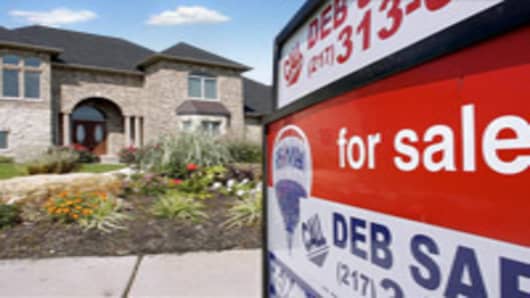There has been plenty of political talk about the economy this week, but precious few words about one of the biggest drags on the economy: housing.
Despite recent signs that the housing market is improving, it is far from healthy.
Home prices are still down 31 percent from their 2006 peak according to the latest S&P/Case-Shiller home price report, and nearly 12 percent of all mortgages are either delinquent or in the foreclosure process, according to the Mortgage Bankers Association. (Read More: How Investors Are Skewing Home Price Recovery.)
Republican presidential candidate Mitt Romney has said that government should stay out of the housing market and let it correct on its own. Wednesday night, his running mate, Paul Ryan said President Obama didn’t do enough to “correct” the housing crisis, but offered no plan of his own. (Read More: CNBC Special Report: Your Money, Your Vote.)
You would think they would hit housing harder, given that many of the nation’s swing states also have the dubious distinction of holding the highest foreclosure rates.
Take Florida. It had the third highest foreclosure rate in the nation in July, according to RealtyTrac, and that’s up from the sixth highest just in June.
The numbers there are rising because of a huge backlog of delinquent loans stuck in a judicial foreclosure pipeline. Now that the courts are starting to move again, the foreclosures are coming home to roost.
In addition, 46 percent of Florida borrowers owe more on their mortgages than their homes are worth, according to CoreLogic. That’s twice the national number.
Nevada, another key swing state which President Obama recently visited to push his refinance plan, has the sixth highest foreclosure rate. Sixty-three percent of borrowers there are underwater.
The government’s Home Affordable Refinance Program, which lets underwater borrowers with Fannie Mae and Freddie Mac mortgages obtain lower interest rates, refinanced 422,969 loans in the first half of this year, more than all of the HARP refinances last year, according to the Federal Housing Finance Agency.
That is largely due to changes in the plan, one of which lifted the cap on how far underwater a borrower could be. More than two-thirds of borrowers in Nevada refinanced through HARP. \(Read More: 'Wind Down' of Fannie, Freddie: 'Positive for Housing'?\)
Michigan and Ohio also rank in the top ten highest foreclosure rates, and their underwater borrower rate is also well above the national average. Neither Governor Romney nor President Obama have targeted any housing policy action at either of these states of late.
While many have criticized the Obama administration’s housing bailout, calling it too little and too complicated, the Romney camp has offered nothing other than to criticize the president’s home buyer tax credit that ended in 2010.
Last year, when asked about his plan to fix housing, Romney said, “Don’t try to stop the foreclosure process, let it run its course and hit the bottom.” Later he suggested that the housing market was unlikely to “cure” itself.
One thing working in both sides’ favor is that those hardest hit by the housing crash likely won’t vote. You would think that homeowners in trouble would want to make their voices heard, but the opposite is the case. (Read More: Cautious Moves on Foreclosures Haunting Obama.)
Not only are Americans who lost their homes to foreclosure less likely to vote, but those in neighborhoods impacted by foreclosure are also less likely to vote than those in more stable communities, according to researchers at the University of California, Riverside.
“Neighborhoods affect the political participation of their residents,” the scholars wrote. “Other things being equal, individuals are more likely to vote when they live in places where neighbors vigorously participate in politics, while individuals are less likely to vote when their neighbors are less civically active. Given that foreclosure creates instability in communities, areas that experience higher levels of foreclosure have lower voter turnout.”
There is also a large body of evidence that homeowners are more likely to vote than renters, and that is true in high and low income neighborhoods alike. Given that more Americans are now renting, we could see a big drop in overall voter turnout. (Read More: As Housing Recovers, Will Apartment Boom End?)
Perhaps that is why housing, one of the biggest issues affecting Americans today, is getting almost no voice in the political rhetoric.
—By CNBC's Diana Olick
Questions? Comments? RealtyCheck@cnbc.comAnd follow me on Twitter @Diana_Olick



